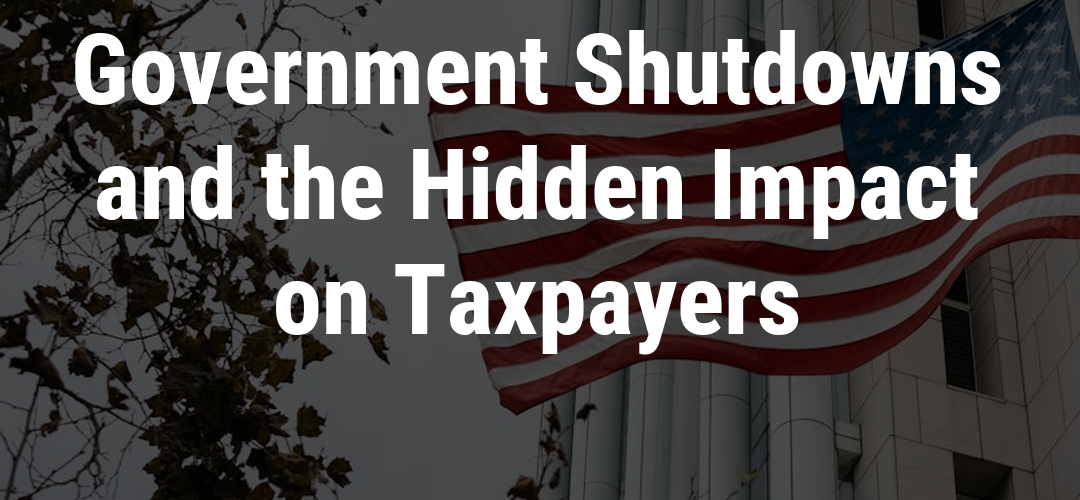by Aprio | October 6, 2025
This article was originally published by Aprio on October 01, 2025.
Summary: A government shutdown can affect millions from federal agency operations and IRS services to individual taxpayers, resulting in significant delays. Discover what to expect, how to prepare, and how these disruptions could affect your tax filing and returns.
Government shutdowns in the United States have become all too familiar in recent decades due to Congress’s inability to reach an agreement on budget priorities and federal funding. Since Congress is the only governing body that can apportion funds to federal agencies, a stalemate in budget negotiations means most federal operations are suspended. This leads to widespread furloughs of government employees and a significant disruption in operations, even impacting the daily lives of everyday Americans.
Why Do Government Shutdowns Happen?
At the center of a government shutdown lies a political deadlock. Adding complexity to the current landscape is the executive branch’s impoundment of funds that have already been apportioned by Congress. Withholding and even canceling the distribution of funds to several federal agencies and organizations has left lawmakers in a difficult position, unsure as to whether appropriated funds will actually be spent. While numerous lawsuits have been filed questioning the administration’s authority to impound or repurpose the appropriated funds, the Supreme Court has not yet provided a definitive ruling.

How Do Shutdowns Affect Taxpayers?
For most people, a government shutdown might feel distant, but with the extended tax due date for individuals approaching, taxpayers may be the first to feel the effects. During a shutdown, most federal employees are furloughed until normal government operations resume. Only those providing critical, essential services are required to remain open.
Unfortunately for taxpayers, the Internal Revenue Service (IRS) is not considered essential, and must halt most operations, placing nearly all employees on furlough. Despite these disruptions, it’s important to understand that shutdowns have the potential to last indefinitely and there are no automatic extensions to any deadlines, including estimated tax payment due dates. Taxpayers are still required to fulfill their filing and tax liability obligations on time.
While the IRS continues to work at a limited capacity during a shutdown, it may lead to significant delays and postponed resolutions for taxpayers with pending IRS issues. This could ultimately mean an extended period of wait time for taxpayers expecting refunds and severely limited communication and support from the IRS, leaving taxpayers with questions or concerns in a difficult position while trying to file their tax return.
Additional Impacts of a Government Shutdown
The effects of a shutdown extend well beyond taxpayers who have yet to file their tax returns. Taxpayer assistance centers must also close their doors during a shutdown, resulting in the cancellation and rescheduling of any meetings related to appeals and audits until the agency resumes normal operations. These disruptions add to the already lengthy wait times for those seeking resolution on existing IRS cases.
Another issue taxpayers and tax professionals could face is the delay in guidance on newly passed tax legislation, such as provisions in the One Big Beautiful Bill. The potential for widespread layoffs following a shutdown creates additional delays and contributes to the growing backlog the IRS is already facing, further straining resources and extending wait times across the board.
Final Thoughts: Staying Informed and Prepared
While not all government functions shut down completely, the impact on taxpayers can be substantial. It’s important for taxpayers to stay informed by remaining patient and understanding their tax obligations.
Please connect with your advisor if you have any questions about this article.
Embark on a journey to financial well-being!
Contact Verity CPAs today for a personalized consultation!
This article was written by Aprio and originally appeared on 2025-10-01. Reprinted with permission from Aprio LLP. © 2025 Aprio LLP. All rights reserved. https://www.aprio.com/government-shutdowns-and-the-hidden-impact-on-taxpayers-ins-article-tax/
“Aprio” is the brand name under which Aprio, LLP, and Aprio Advisory Group, LLC (and its subsidiaries), provide professional services. LLP and Advisory (and its subsidiaries) practice as an alternative practice structure in accordance with the AICPA Code of Professional Conduct and applicable law, regulations, and professional standards. LLP is a licensed independent CPA firm that provides attest services, and Advisory and its subsidiaries provide tax and business consulting services. Advisory and its subsidiaries are not licensed CPA firms.
This publication does not, and is not intended to, provide audit, tax, accounting, financial, investment, or legal advice. Any tax advice contained in this communication (including any attachments) is not intended or written to be used, and cannot be used, for the purpose of (i) avoiding penalties under the Internal Revenue Code or under any state or local tax law or (ii) promoting, marketing or recommending to another party any transaction or matter addressed herein. Readers should consult a qualified tax advisor before taking any action based on the information herein.

